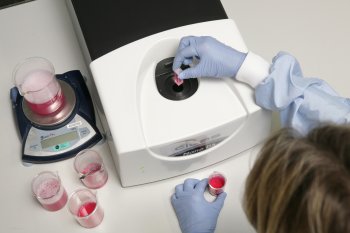The new Nano DS Dual Light Scattering Particle Size Analyzer from CILAS integrates a breakthrough technology that takes nanoparticle characterization to the next level. The Nano DS is the first nanoparticle size analyzer to combine Dynamic Light Scattering (DLS) and Static Light Scattering (SLS) in the same particle size instrument.
This ensures accurate particle size measurements across the entire measurement range, from 0.3 nm to 10 microns, and eliminates many of the shortcomings of instruments using only Dynamic Light Scattering.

Dynamic light scattering uses Brownian motion to measure the size of nanoparticles. It is well known that dynamic light scattering is not as effective for analyzing larger particles (>3 microns) and when analyzing a blended product. To overcome this technical challenge, Cilas has developed the Nano DS, which seamlessly integrates both Dynamic and Static Light Scattering. The Nano DS ensures your nanoparticle characterization results are accurate even if your sample is agglomerated or has a multi-modal size distribution. This innovative new technology provides you with the best accuracy and repeatability over the entire 0.3 nm to 10 micron size range. Besides, the Nano DS is provided with the first multi-angle DLS analysis on the market. With detection from 10° to 150°, this instrument allows Back Scattering DLS measurements for non-diluted samples. The Nano Expert software provides a fast multi-angles scanning protocol as well as user defined protocol for complex R&D needs.
The Nano DS features a solid state laser diode technology. This laser diode has a higher life time than laser gas source to ensure low cost maintenance and no costly periodic replacement of the laser. The laser diode technology needs only a very short warm-up time, and its excellent thermal stability improves the repeatability of the instrument. Its high sensitivity detector, using the PMT (Photo Multiplier Tube) technology, has an excellent signal noise ratio, which ensures better and faster results.
The use of the Nano DS is intuitive, the measurement and analysis are controlled directly by the user through a user-friendly software: the Nano Expert. The measurement sequence can be launched with just one click. The real time 3D Mimic screen allows the user to visualize simply all step of the analysis process. The software is compatible with the latest versions of Windows. An automatic report editing system is embedded in the software to facilitate data management, results comparison and report retrieval.